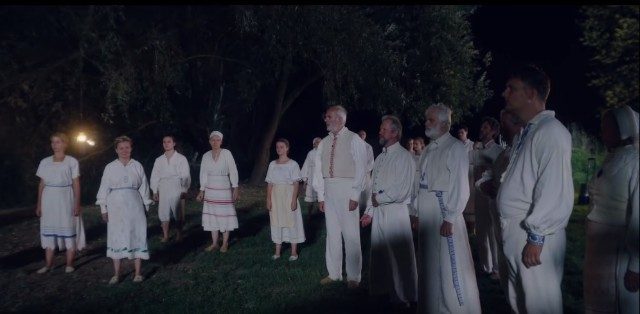SUMMARY
This is AI generated summarization, which may have errors. For context, always refer to the full article.

It would seem like Ari Aster’s Midsommar is created from the same mold as Robin Hardy’s The Wicker Man (1973), The Green Inferno (2013) and other horror films that mine fear, shock and shlock from fictional cultures that swerve away from mainstream civilization.
Indeed, the film bewitches and bewilders with its sundrenched spectacles of linen-clad Scandinavians in various states of ceremonial frolicking, but beyond conjuring trepidation out of the exotic, Aster’s profoundly absorbing sophomore feature film finds ample fault in what humanity has turned into, all through the dour experiences of a couple at the tail-end of their relationship.
Ornate details and subtle layers
Midsommar is scant on plot, allowing it to dress itself with ornate details and subtle layers.
Troubled by an email she received from her sister, Dani (Florence Pugh) reaches out to Christian (Jack Reynor), her boyfriend of several years, for emotional support, which he gives. Christian, however, is far from the doting partner he appears to be when he is alone with his friends as he admits to the fact that Dani and her many issues have been turning into a gargantuan chore for him. Unfortunately, in one fell swoop, Dani’s sister and parents perish in a suicide, pushing Dani further into depression, and forcing Christian to invite her to Sweden to study a commune and indulge in what they think would be a hedonistic adventure full of sex, drugs, and strangeness.
Midsommar does not hide its fealty to traditional horror, with its crew of would-be victims of the far-flung society teetering towards being outright stereotypes that seem more suited in a B-grade slasher flick. It is not entirely a surprise that crass and bumbling Mark (Will Poulter), inexplicably curious and competitive Josh (William Jackson Harper) and the two lovey-dovey British tourists (Archie Madekwe and Ellora Torchia) are in the film as fodder, utilized for humor and whose fates somewhat symbolize the explicit folly of mainstream society in its view of the rest of the world as curiosities meant for academic research or aimless wonder.
What is important to note however about Aster’s film is that it dutifully satisfies the demands of evoking dread just like a good horror film should without rehashing tropes and clichés. If anything, Midsommar rides on all the set expectations of the vast array of films that have exploited the glaring and often gory gap between modern society and its either savage or supernatural past. But it commits to do so not just with innovation or elevation but also acutely critical observations of the perspective that it borrows to engage the clearly imagined but representative culture it milks for horror.
Surprisingly gorgeous
Midsommar is a surprisingly gorgeous film, steering away from the notion that fright and discomfort are exclusive to shadows.
Right after the prelude that subtly exhausts all the disquieting dysfunctions of a relationship that is inexplicably staggered to the point of torture, the film completely surrenders to suspicious sunlight and colors. Aster pits the allure of both an exotic land and culture with all the repressed adversities, expertly confusing his audience as to what to feel about his barrage of grotesqueries, ranging from the innocent to the seemingly depraved. He blurs the lines that define the typical victim of a horror film, associating what can be normally regarded as the stereotypical creeps of the genre as the guiltless harbingers of what a perfect community should be.
The horror here isn’t really culled from conventional evil.
The horror stems from the clash of cultures, the appropriation of conventional morality to outwardly ghastly rituals that only reinforce the concept of community. This is what makes Midsommar an exceptional film. It pushes its audience to question what it regards as bad and good. It puts to the fore the inconsistencies of modern-day world views and the many ideas it regards as virtues such as the supremacy of individual wants and needs over the communal body. The film’s very final frame emphasizes the truest escape from contemporary woes, where emotions are shared and an individual finally finds fulfilment and belongingness amidst fire, pain and chaos.

Disquiets and disarms
Midsommar is an astonishing film.
It disquiets and disarms. It bursts with bizarre beauty, blending it with the odd and the absurd, enunciating that the world and the humans that inhabit it are more mysterious and complex, and that is scary. — Rappler.com

Francis Joseph Cruz litigates for a living and writes about cinema for fun. The first Filipino movie he saw in the theaters was Carlo J. Caparas’ Tirad Pass.
Since then, he’s been on a mission to find better memories with Philippine cinema.
Add a comment
How does this make you feel?
There are no comments yet. Add your comment to start the conversation.